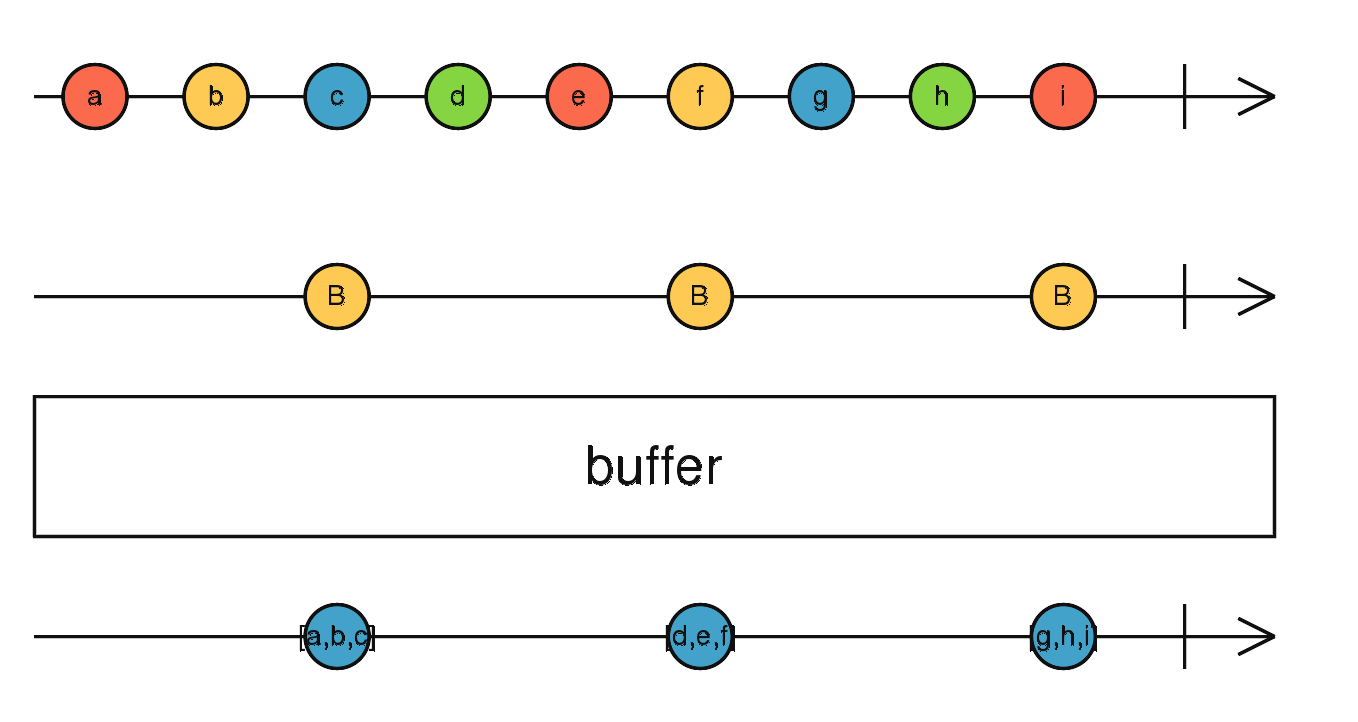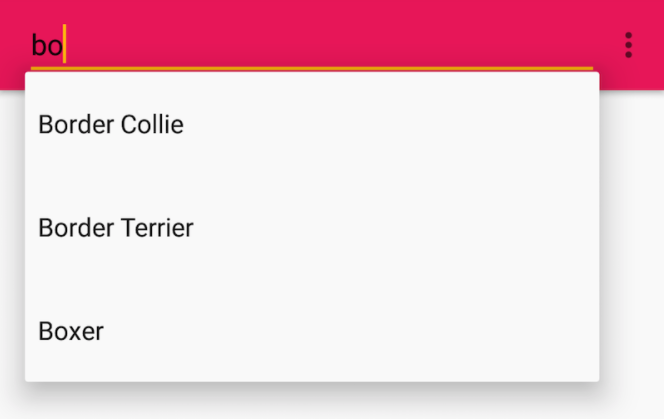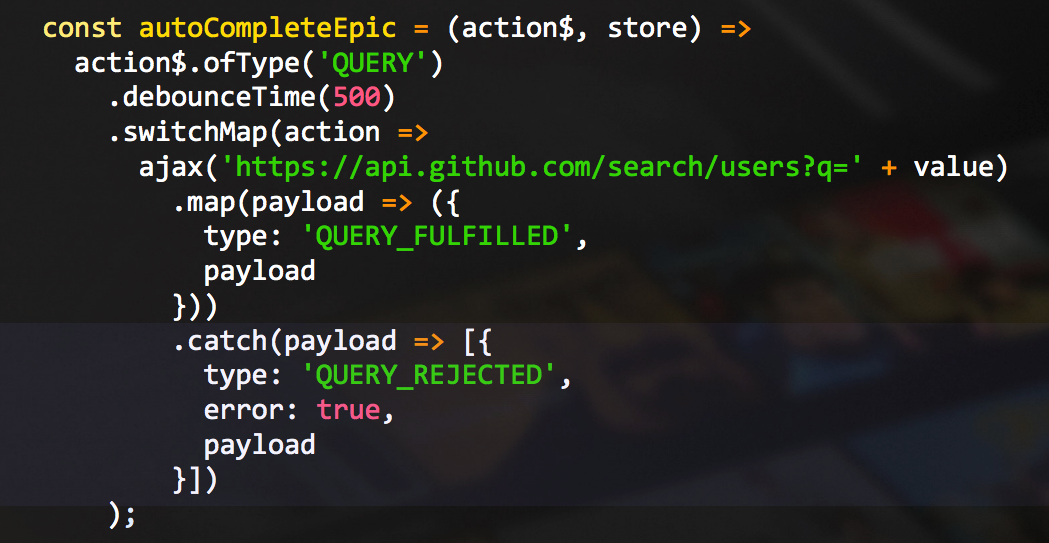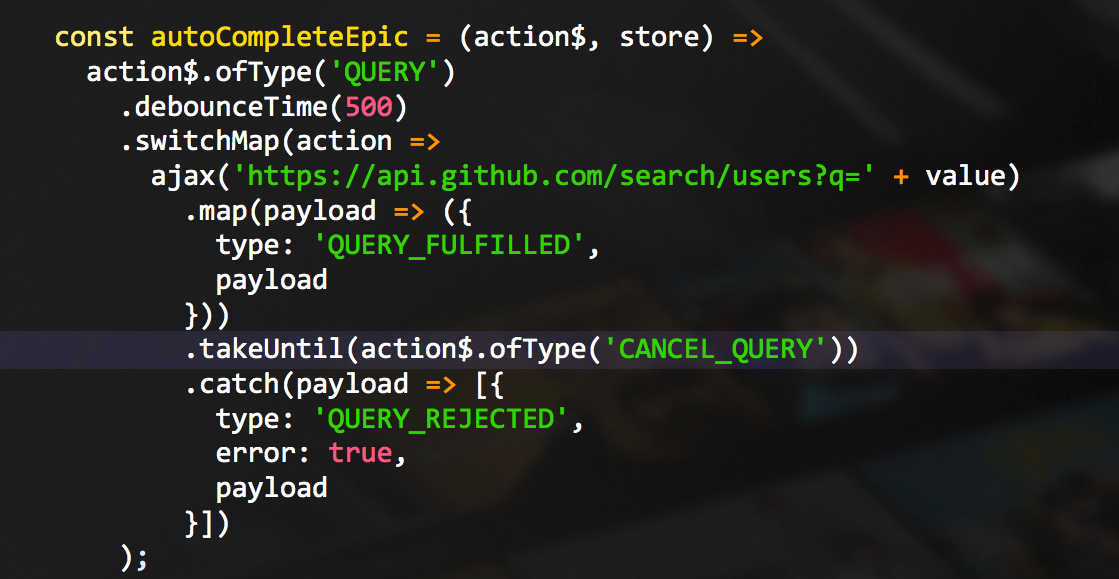RxJS + React + Redux




RxJS Primer
Reactive Programming
- Reactive programming is an asynchronous programming paradigm concerned with the data streams and propagation of change.
- It treats the events happening in the app as an Asynchronous Data Streams.
- Streams are a set of data, with a dimension of time.
- Standardised by ECMAScript

Observables & Observers
Observable: Simply put, an observable is a stream of events than can be observed or listened to.
Observer: Observer are the objects that subscribes/listens to an Observable.

Observables & Observers
Observable: Simply put, an observable is a stream of events than can be observed or listened to.
Observer: Observer are the objects that subscribes/listens to an Observable.
import Observable from 'rxjs/Observable';
const pulseStream = Observable.create(observer => {
observer.next(72);
setTimeout(() => observer.next(80), 1000);
setTimeout(() => observer.next(60), 2000);
});
pulseStream.subscribe(data => {
console.log(data);
})
/*
Output is
72
80
60
*/Why Observables?
To handle asynchrony.
We can handle it already in two ways:
- Callbacks
- Promises
Problems associated with callbacks:
Callback Hell
Problems associated with Problems:
- Guaranteed Future
- Immutability
- Single Run

Operators
RxJS Api exposes a lot of stream creation & transformation operators
Rx.Observable.Of
The simplest creation operator of all.
This operator creates an Observable that emits the values you specify as arguments, immediately one after the other, and then emits a complete notification

const numbers = Rx.Observable.of(10, 20, 30);
numbers.subscribe(x => {
console.log(x);
}, err => {
console.log(err);
}, () => {
console.log('done');
});
//output
/*
10
20
30
done
*/Rx.Observable.fromEvent
fromEvent method creates an Observable that emits events of a specific type coming from the given event target.
const clickOb = Rx.Observable.fromEvent(document, 'click');
clickOb.subscribe(ev => console.log(ev));
Rx.Observable.fromPromise
fromPromise method simply converts a promise in to an Observable.It returns an Observable that just emits the Promise’s resolved value, then completes.
const result = Rx.Observable.fromPromise(fetch('http://myserver.com/'));
result.subscribe(x => console.log(x), e => console.error(e));Rx.Observable.interval
interval operator creates an Observable that emits sequential numbers every specified interval of time.It starts with 0 and it never ends.
var numbers = Rx.Observable.interval(1000);
numbers.subscribe(x => console.log(x));
// output
/*
1
2( 1 second later)
3( 1 second later)
4( 1 second later)
5( 1 second later)
. . .
*/
Rx.Observable.timer
Timer creates an Observable that starts emitting after an initialDelay and emits ever increasing numbers after each period of time thereafter.
const numbers = Rx.Observable.timer(3000, 1000);
numbers.subscribe(x => console.log(x));

Transformation Operators
Rx.Observable.prototype.map
Transforms the items emitted by an Observable by applying a function to each item

var clicks = Rx.Observable.fromEvent(document, 'click');
var positions = clicks.map(ev => ev.clientX);
positions.subscribe(x => console.log(x));Rx.Observable.prototype.filter
Transforms the items emitted by an Observable by applying a function to each item
var clicks = Rx.Observable.fromEvent(document, 'click');
var clicksOnDivs = clicks.filter(ev => ev.target.tagName === 'DIV');
clicksOnDivs.subscribe(x => console.log(x));
Rx.Observable.prototype.buffer
Collect output values from the given observable until the other observable emits
var clicks = Rx.Observable.fromEvent(document, 'click');
var interval = Rx.Observable.interval(1000);
var buffered = interval.buffer(clicks);
buffered.subscribe(x => console.log(x));
Usage with Redux
Usage with Redux
redux-observable

redux-observable
Installation
npm install --save redux-observableEpics
- An Epic is the core primitive of redux-observable.
- It is a function which takes a stream of actions and returns a stream of actions. Actions in, actions out.
Signature
function (action$: Observable<Action>, store: Store): Observable<Action>;The actions you emit will be immediately dispatched through the normal store.dispatch(), so under the hood redux-observable effectively does epic(action$, store).subscribe(store.dispatch)




Epic for AutoComplete
Epic for AutoComplete with Cancellation

Combining Epics
import { combineEpics } from 'redux-observable';
const rootEpic = combineEpics(
pingEpic,
fetchUserEpic
);equivalent to
import { merge } from 'rxjs/observable/merge';
const rootEpic = (action$, store) => merge(
pingEpic(action$, store),
fetchUserEpic(action$, store)
);Configuring the Store
import { createEpicMiddleware } from 'redux-observable';
import { rootEpic, rootReducer } from './modules/root';
const epicMiddleware = createEpicMiddleware(rootEpic);
const store = createStore(
rootReducer,
applyMiddleware(epicMiddleware)
);
Benefits of redux-observable
- Makes it easier to compose and control complex async tasks, over any amount of time
- You don't need to manage your own Rx subscriptions
- You can use redux tooling
Thanks
@paramsingh_66174

Questions & Musings
References
RxJS, React & Redux
By Param Singh
RxJS, React & Redux
- 850



